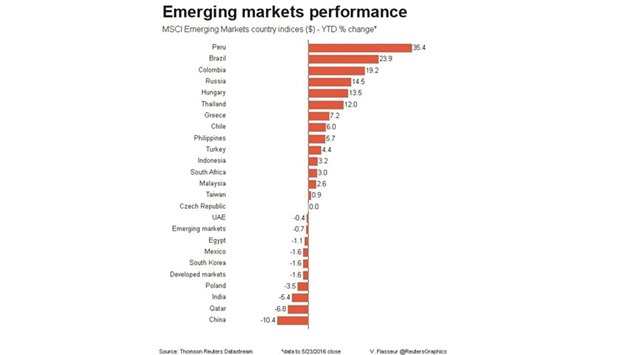Turkey’s lira bounced off near four-month lows yesterday after investor-friendly Deputy Prime Minister Mehmet Simsek kept his post in government, though Turkish and other emerging assets came under pressure from a firmer dollar.
Expectations have swung in favour of a June rate hike by the US Federal Reserve after robust data and suggestions by officials that a delay would be unwise.
That has eroded some of emerging markets’ recently acquired gloss, taking stocks down 6.5% so far this month.
MSCI’s emerging equity index fell half a per cent, resuming its fall after two days in the black, while most currencies weakened against the dollar.
The lira initially fell a quarter per cent to the dollar on fears Simsek would be excluded from the new cabinet as well as expectations the central bank would cut the upper band of the interest rate corridor by 25-50 basis points.
The currency rebounded 0.6% after the news that Simsek, a key member of Turkey’s economic management team, had kept his job. Istanbul shares jumped 1.7% and ten-year lira yields fell more than 50 bps after initially hitting three-month highs.
But a rate cut will likely bring pressure back to the lira.
SEB strategist Per Hammarlund said a cut would hit the currency and increase fears about political interference in monetary policy.
“Global risk appetite is what drives 70-80% of the move, so it is mostly about changing sentiment towards emerging markets,” Hammarlund said.
“But if the central bank cuts now when sentiment is souring, they are reinforcing an already weakening tendency.
It will amplify the move.
The low that we saw (in the lira) earlier this year is definitely in play...the new year lows of 3.10 perhaps.”
In line with the global trend, other emerging currencies also slipped, with the rand falling 0.6% and the rouble falling 0.3% to the dollar
South African markets are also watching domestic developments, after a court ruled in favour of reinstating corruption charges against President Jacob Zuma and the statistics agency revised down the growth rate for the last quarter of 2015 to just 0.4%.
Bond markets are focused on Russia’s new eurobond, its first in three years which it said had already garnered bids of $5.5bn.
Books are due to close later today and Moscow has hinted at a yield of 4.65-4.90%, roughly a 50 basis point premium to the existing 2023 issue.
Russian yield spreads to Treasuries were flat at 250 bps, a one-week high.
Foreign funds are wary of the bond, fearing repercussions due to US sanctions on some Russian entities including VTB, the owner of the investment bank arranging the deal.
Societe Generale credit strategist Regis Chatellier said much depended on the issue’s eligibility for the EMBI Global bond index.
“If it goes to the index, dedicated investors will have to ask themselves what to do.
If it is not euro clearable, and it is not part of the index, the pool of investors will be much reduced,” Chatellier said.
“But they will find some buyers here and there, because theoretically if the money goes to the sovereign then this transaction is not under sanction.”
Elsewhere, Mozambique’s restructured 2023 dollar bond fell one cent after government failed to come up with cash to meet a loan repayment deadline on Monday.
Nigeria’s naira fell 1% in the one-month non-deliverable forward market ahead of a central bank meeting that could deliver a rate hike to combat inflation but could also introduce a new parallel exchange rate.
The government is now using a lower, 285 per dollar rate for petrol imports rather than the official 197 rate.
The Hungarian forint rose 0.4% against the euro ahead of a central bank meeting that may cut rates by 10-15 bps while signalling the end of the easing cycle.
The zloty hovered at 3-1/2-month lows as tensions flared with the European Union over the rule of law in Poland.

EME
